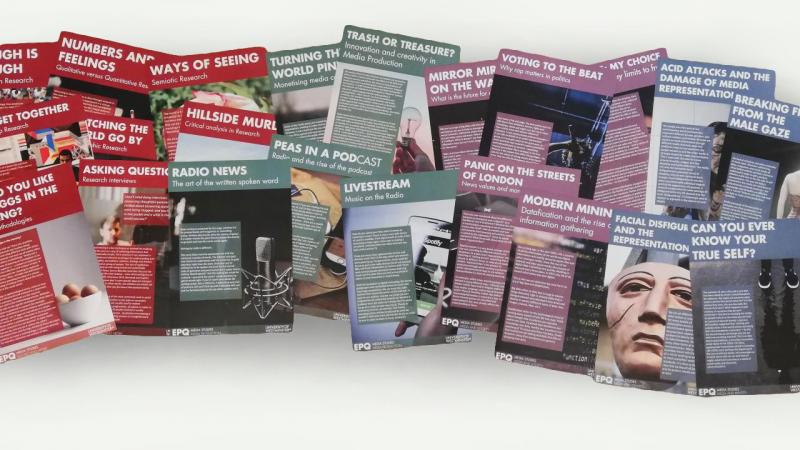The following resources were developed as part of a project at the School of Media and Communication, University of Westminster.
The EPQ (Extended Project Qualification) provides the opportunity to demonstrate creativity through engagement with a diverse range of topics.
Projects could include: the writing of an extended essay on the dangers of advertising; conducting a scientific investigation on boiling an egg; building a robot; making a film; producing a newspaper; writing a screenplay; designing a computer programme; making a video game… the choices are endless!
The EPQ is an independent research project providing you with the opportunity to demonstrate your ability to think critically, creatively and in depth about a topic. Designed to extend learning beyond the curriculum, it allows you to explore new and diverse directions.
Here at the University of Westminster we have developed a range of resources and programmes for students and teachers to support this exciting opportunity.
EPQ Media Studies Resources
Created by senior academics from our School of Media and Communications these resources are designed to help promote ideas and activities for Research Methods, and Media Studies related work.
Each card contains key information on its topic, provides suggestions for further open access readings and group work to explore contemporary themes in media communication. These resources also offer a way into other subjects, including Sociology, History, Geography and English. Our range of research focused resources can be used to guide students in any discipline.
DOWNLOAD ALL EPQ MEDIA STUDIES CARDS (9.5MB)
Media and Identity
In a world where identity and the media are ever more closely linked, the cards in this series seek to explore how our own identity is constructed and represented through the media we consume, and what the wider implications of this are.
These cards provoke questions around what makes us human, what makes us who we are and how are we represented in the media.
- Facial disfigurement and the representation of evil
- Acid attacks and the damage of media representation
- Can you ever know your true self?
Media and Society
Media and Society are inextricably linked in our modern world of mass communication and mass consumption. These cards draw out and challenge some of the key debates surrounding the social, political and economic significance of the media and how these are changing in the 21st Century.
- My phone; my choice – Should there be any limits to free speech
- Breaking free from the male gaze
- Mirror Mirror on the wall – What is the future for us all?
- Modern mining – Datafication and the rise of information gathering
- Panic on the streets of London – News values and moral panic
- Voting to the beat – why rap matters in politics
- What you call love was invented by guys like me to sell nylons – Introduction to advertising theory
- Knowing meme knowing you – How memes influence our society
- Love in a hot climate – Fashion media and sustainability
Media Production
How do you listen to music? Is there a trick to radio production? What is the link between production, distribution and exhibition? The media production cards series looks at aspects of production across media platforms.
Supporting the creation of production with theory and conceptual thinking, these cards show how to develop an academic approach to a practical discipline.
- Livestream – Music on the radio
- Turning the world pink – Monetising media content
- Peas in a podcast – Radio and the rise of the podcast
- Radio news – the art of the written spoken word
- Public service internet – Could the BBC create an alternative to YouTube?
- The future of the internet
- The colour of magic – Metamerism
Researching Media and Communications
This series of research methods cards introduces the main research traditions in media and communication studies and explores a range of methods of data collection and analysis employed in research.
A range of research methods are demonstrated here with each card examining a different stage of the research and writing process.
- Watching the world go by – Ethnographic research
- Let’s get together – Focus group research
- Asking questions – Research interviews
- How do you like your eggs in the morning? – Research methodologies
- Numbers and feelings – qualitative versus quantitative research
- Enough is enough – Sampling in research
- Ways of seeing – Semiotic research
- Hillside murder – Critical analysis in Research
More information
For more information on the courses and resources created by the School of Media and Communications please contact me.
These resources were developed by the Westminster School of Media and Communication. The project has been coordinated by Ellen Roseblade, Doug Specht, Eleri Kyffin and Sara Hafeez.

